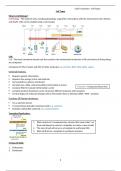Cells To Systems - Cell Types
Cell Types
What Is Cell Biology?
Cell Biology - The study of cells, including physiology, organelles, interactions with the environment, life, division
and death. Cells can be studied using a microscope
Cell:
Cell - The basic membrane-bound unit that contains the fundamental molecules of life and where all living things
are composed
Composed of 70% of water and 30% of other molecules e.g. proteins, RNA, DNA, lipids, sugars
Universal Features:
Requires genetic information
Requires free energy to live and replicate
Surrounded by a plasma membrane
All cells have a DNA, where hereditary information is stored
Transient - Temporary/Short time
Contains RNA for transient information carrier
Contains proteins (functions can be structural, different enzymes and transport)
Central dogma of molecular biology where information flows 1 direction (DNA > RNA > protein)
Functions Of Plasma Membrane:
It is a selective barrier
It concentrates desirable materials inside e.g. nutrients
Excludes undesirable materials e.g. waste products
Templated Replication:
1. DNA consists of 2 complementary strands (this means that 1 of
them will always be used as a template to create a new strand)
2. The new strand will serve as a template to synthesise RNA
3. RNA will then be a template to synthesise proteins
2 Types Of Cells:
1. Prokaryotes
2. Eukaryotes
1





